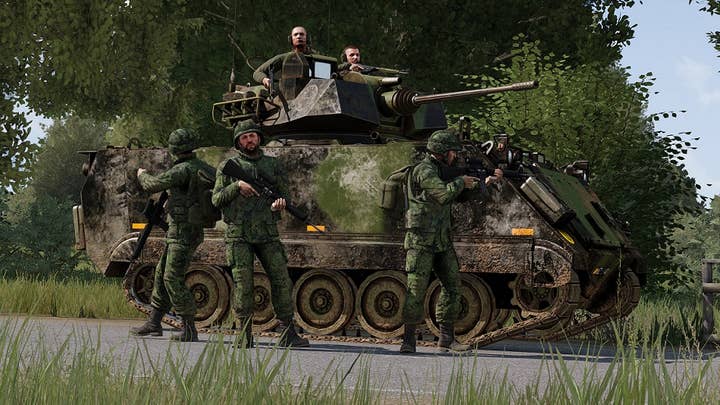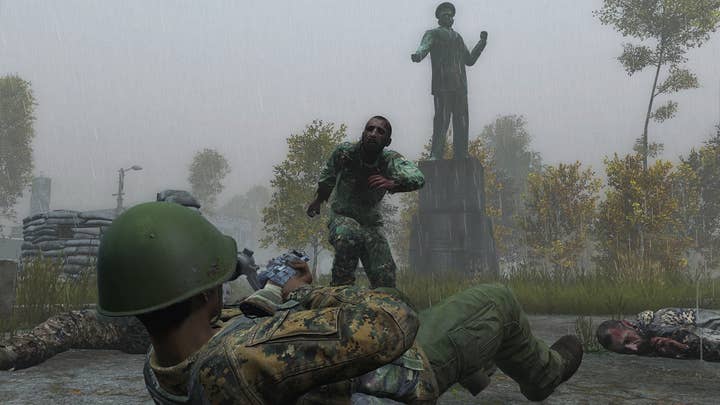How Bohemia's "almost accidental" mod support became a staple of the studio
Karel Mořický talks about the benefits and challenges of the Arma and DayZ studio's community development efforts
When Bohemia Interactive released Operation Flashpoint: Cold War Crisis in 2001, the developers had no inkling of just how that game would shape the studio's future.
Speaking with GamesIndustry.biz, Bohemia Interactive senior game designer Karel Mořický says the Arma studio's embrace of modding has been crucial for its success but not always something done by design.
"Back in 2001 in Arma's grandfather, Operation Flashpoint, modding was almost accidental," Mořický says. "When one of the first modders brought the developers one of their mods on a floppy disk, they didn't even realize it was possible to mod the game; it was just a collateral benefit of the open architecture of the whole project that others could hook their creations into it."
"Back in 2001 in Arma's grandfather, Operation Flashpoint, modding was almost accidental"
After that, the studio's support of modding was practically a matter of inertia. Mořický says that because the studio's follow-up games were based on the same engine, it was easier to leave it in and/or build on it rather than cut it out. And when the studio started hiring developers from the mod community, they naturally wanted to focus on features for the community even more.
"We always saw it as a way to prolong the game's lifespan," Mořický says. "Operation Flashpoint was around for four years. Arma 3 at this moment is seven years since being released, and I believe it still has half a million monthly players. So it extends the lifetime of the game beyond what official support could even do."
Mod support did a lot more than extend the lifespan of Bohemia's hit games. It also extended the number of hit Bohemia games, as the company's open-world survival shooter DayZ began life as a mod for Arma 2. And while Bohemia isn't the company profiting the most off of this, it's worth noting that Brendan Greene -- PlayerUnknown of PlayerUnknown's Battlegrounds fame -- first proved out the template of the battle royale shooter subgenre in mods for Bohemia games like Arma 2 and DayZ.

What started as inertia grew into something that could almost be construed as a philosophy for the studio.
"It was really just about making sure modders can create, that they are not disturbed by us changing the game too much"
"It was really just about making sure modders can create, that they are not disturbed by us changing the game too much," Mořický says. "When we leave them in that petri dish for some time, DayZ can happen, or PUBG can happen."
Mořický says the mod scene doesn't need much guidance from Bohemia, but it does need support and documentation. To ensure that, the company has made a conscious decision to build its games using the tools it makes available to modders.
Mořický explains that if the developers were using their own separate tools, it would be too easy for them to add a key feature to the dev toolset and reason that they could make the mod equivalent later on. It would also be easy for that same decision to be made a few times in succession, and before long, he figures the gap between the two toolsets would be vast and the modder tools would fall into disrepair.
Bohemia also has to be mindful of how it rolls out new updates. Some of the mods people make are only possible because of certain quirks or bugs in the original code, so whenever Bohemia fixes those or changes the way something in the game works, it risks breaking any number of mods. Mořický says on occasion the studio even has to revert a fix and leave something broken in the game if it impacts too many mods too negatively.

He adds QA on a mod-friendly game can also be difficult as players may be using a different assortment of mods and certain bugs may only happen when a specific combination of those mods is implemented.
Not every aspect of Bohemia's games is designed to be modded -- Mořický says game modes and maps are one thing, but players wanting to adjust the game's AI will need to hack their way around problems -- but it's enough to force the studio's developers to come to grips with a sort of transparency not often seen in the industry.
"In developing moddable games, you often feel naked, that everybody can see you and evaluate how you're doing"
"Modders will always see our data," Mořický says. "Whatever we release, modders can immediately see it. Every time we release a patch, there are detectives checking what's different and judging our changes. In developing moddable games, you often feel naked, that everybody can see you and evaluate how you're doing. There's nothing more embarrassing than when you make a typo in some script and some modder spots it and posts it back on the open bugtracker and even offers a solution.
"The worst thing is that the modder is right. Such shame!"
It's a struggle sometimes to put the time and effort into supporting something that can ruin your whole day like that, but Mořický says it's all worth it when modders dig through the code and make the game do things the developers never anticipated.
To illustrate the point, he talks about a bit of a clash he was having with another member of the developer team on Arma 2. The team was working on DLC for the game, didn't have enough resources to handle everyone's wish list of new content, and had to choose what to keep and what to leave out. Mořický lobbied for a new sniper rifle to make the cut, while another developer wanted to have bleachers made for use in a demo mode of the game. When the decision was made to go with the bleachers over the sniper rifle, Mořický thought the game would be worse off for it.
He changed his mind about that when he saw a video of the "Battle Bus," a vehicle a player had rigged together using the game's standard bus outfitted with the new bleachers as armor and sporting an unreasonable number of machine guns.

"We had absolutely no idea this would happen," Mořický says. "We couldn't have predicted it, but we were upside-down amazed by it. I definitely don't regret not pushing harder for the sniper rifle instead."
Back when Bohemia first stumbled into its mod-friendly focus, it was pretty common for the biggest and best PC games to support modding communities. These days Mořický guesses that the actual number of mod-friendly games is probably about the same, but they seem fewer and further between as the number of games released has grown exponentially.
The ranks of mod-friendly games have also been hurt by having other avenues with low barriers into game development.
"Definitely what has happened is that Unity and Unreal happened, professional game engines where you can make a game from the ground up are accessible to people who just have a lot of time and curiosity on their hands," Mořický says. "Back then there were no such tools, so the only way you could learn how to make a game if you didn't want to learn C++ was to pick your favorite game and check its modding tools."
"At some point 'The Netflix of Games' will become a really big thing, and you can't mod a game that's running on some computer kilometers away"
It also doesn't help that those game engines like Unity and Unreal have huge companies backing them as a focus of their business. They will likely always be able to spend more time and resources on documentation and user support than a development studio like Bohemia because its focus is creating a game, with mod support as a side endeavor.
Even if the mod-friendly game scene seems a bit thin right now, that's far from the worst-case scenario for them in the future.
"There are a lot of unknowns when it comes to streamed games," Mořický says. "It's not necessarily popular now, but at some point 'The Netflix of Games' will become a really big thing, and you can't mod a game that's running on some computer kilometers away. So that will be challenging."
In the event that streaming services took over and modding became a fringe activity not supported on any of the primary ways people play games, Mořický says the industry would lose at least some creativity.
"I won't say all because there are other ways, but many people who want to get into games would lose a venue where they can easily get into it," he says.
If an Arma player has put hundreds of hours into a game, they might have an idea on how to tweak something in the game. Bohemia's mod support gives them a way to do that, and the existing Arma playerbase means those budding coders will have an audience they can show their work to afterward. It's about as low friction an on-ramp to development as it gets.
On the other hand, if you start a game in Unity, Mořický says you're starting from scratch. There's no terrain, no tanks, no existing game you already know and love to tweak, and no ready-made audience to show it to.
"This very easy entry point to get into game development would be lost, and I don't see a way how it could be replaced by other means," he says. "But I suspect that modding will never go fully away. One thing to know about modders is that they will always find a way. Just look at [Grand Theft Auto]. In GTA, modding is not officially supported. Does it stop people who want to tinker with the game? Hell no.
"I think very often people will find a way to tweak their favorite games even though those products may not officially support it."
All that said, Mořický emphasizes those streaming services are still in their infancy, and any talk of their reshaping the industry is quite speculative.
"I don't think we see a threat right now because the Arma audience is still very dedicated and there are more people who might want to have a game [locally]," he says. "However, we said that about physical discs, that people like them [and wouldn't embrace digital distribution], and things have changed. But still, I think that's very far away and it doesn't influence our immediate plans at all. We don't feel threatened."

